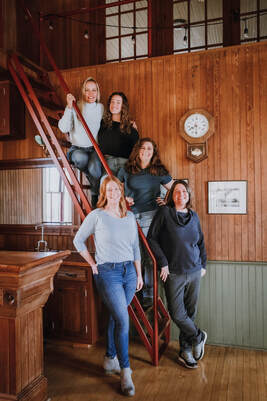 It’s not new news that Montana’s suicide rate ranks as one of the highest in the nation and residents of the Flathead Valley are all too aware of what it feels like to live in that reality. And while they were founded over 20 years ago and remain the only organization solely focused on suicide prevention, the Nate Chute Foundation is growing, evolving, and optimistic as they continue to support their community. When 1999 Whitefish High School graduate Nate Chute unexpectedly took his own life just weeks before attending Montana State University, his parents, Terry Chute and Jane Kollmeyer immediately felt called to process their grief through action to prevent further loss. Soon after Nate’s passing, his parents established the Nate Chute Foundation and registered the organization’s 501(3)c nonprofit status. Quite literally a kitchen table organization, the board consisted mainly of friends of the family who were looking for a way to bring about change and prevent further tragedy. In the early years, NCF provided funding for specialty training for teachers, local clergy, and police officers; suicide prevention commercials on local television stations; the Whitefish High School ROPES program; Whitefish CARE; depression screening for students; and mental health counseling. As the organization thrived and local donations spoke to community’s desire for more support, they hired their first paid employee, an Executive Director, in 2017. Today, the foundation has three full time employees, two part time employees and a volunteer board of directors made up of nine community members. I spoke with Kacy Howard, Executive Director; Jenny Cloutier, Program Director; and Nicci Daniher, Development Director, recently about the local nonprofit and how they are working to promote mental wellness and reduce suicide in our community. I was moved by the dedication of these three native Montana women who are committed the mission of the NCF. They are all Certified QPR (Question, Persuade, Refer) Instructors, which is the most widely taught training in the world as an emergency response to someone in crisis and can save lives. Howard, who was born and raised in the Flathead Valley and a close friend of Nate’s in high school, has been at the helm of NCF since 2017. Before working with the foundation, Howard spent nearly a decade working in community mental health. Howard oversees all of NCF’s operations including programs, fundraising, and nonprofit and board governance. And, while she loves the behind-the-scenes work of helping NCF thrive, she says that the most impactful and energizing part of her work is getting to connect with the humans in our community and help cultivate safe spaces to have really difficult conversation about the real-life issues that we all face. “There’s something cathartic and healing about getting to call on the grief and loss that has been a part of my story to help others find hope in their own,” Howard says. After living and working as a mental health therapist for three years in Australia, Daniher is grateful to be back in her hometown. She has a Master’s Degree in Advanced Clinical Social Work from Columbia University. Daniher saw how many of her classmates, including herself, suffered from depression and anxiety in high school and was drawn to the idea of utilizing her long-standing relationships in the Valley, along with her knowledge of mental illness, to support the NCF through development and fundraising. “I want to change the climate and improve the wellbeing in our schools for my own kids and the future generations.” As one might imagine, working in the realm of suicide prevention can take its toll. Especially after experiencing a suicide cluster in 2021 in which 10 local youth took their own lives, NCF knew that there was opportunity to grow their programs to help better meet community needs. After soul searching and researching, the organization decided to move into the space of resilience building and upstream prevention: instead of just focusing on risk factors, warning signs and how to help a friend with suicidal ideation, they wanted to be able to add selfcare strategies to their offerings. Howard explained, “In some ways, traditional suicide prevention efforts are too focused on crisis mitigation. We believe that we need to start looking upriver and do more resilience building work to help people have the skills and connections so that they hopefully don’t get to that crisis moment, or when they do, they are at least better prepared with some tools and skills to navigate that place." In order to expand programming, it was necessary to bring in new staff. After serving on the NCF board for two years, Jenny Cloutier joined the team. Her Master’s of Education and Certificate in Nonprofit Leadership, as well as also being a lifelong resident of the Flathead Valley, brought a familiarity with schools and strong connections to other nonprofits and businesses in the Valley. Said Cloutier, “I love that the programs we offer are free of charge. From removing financial barriers for those in need of professional services to providing over 2000 local students with suicide prevention training to implementing prevention strategies in local organizations and businesses – we are really looking to create a community that is aware and competent.” She added, “Mental health does not discriminate. It affects us all.” School presentations are the largest program at the NCF. Presentations are facilitated in 7th and 9th grade health classrooms across Flathead Valley. The classroom setting allows these discussions and trainings, using evidence-based curriculum, to be held in a smaller setting where students feel more comfortable asking questions and adults can be aware if any young person seems to be struggling with the content. Topics covered include how to start and manage difficult conversations about mental health, healthy self-care, and coping strategies, and how to reach out for help. In 2022, the Nate Chute Foundation:
I asked about the series of PSAs that are on the foundation’s website that I found to be very powerful. Daniher explained that while these stories were launched during COVID to reach people that were missing day-to-day contact, the messages have proved to be effective tools and stories of hope even after the pandemic. The series is called From Surviving to Thriving: Stories of Hope & Resilience and I’d encourage you to take a look. The stories are told by local members of the community in hopes that they will inspire you to remember to never give up hope, that help is available, and recovery is possible. We are all in this together. As we wrapped up, Howard remarked that Nate’s parents continue to be involved in the foundation. “They turned a tragedy into something that helps the community.” She praised their passion and dedication. Although it’s hard to know the value of all the foundation does, Cloutier added “The support the community has shown is amazing. People believe in what we do.” 988 Suicide and Crisis Lifeline - Text or Call 988 www.natechutefoundation.org Program Offerings: Community Access to Services: NCF offers financial assistance to help those in need access critical therapeutic services and support. We provide funding for youth and adults to receive preventative counseling, postvention counseling for individuals and families impacted by a suicide, and funding for Transcranial Magnetic Stimulation (TMS) through Logan Health Whitefish Behavioral Health. Community Training: NCF offers five different evidence-based prevention curriculums free of charge to business and organizations. Trainings for Schools: NCF provides health class presentations, educator professional development, and policy & procedure consulting. What can you do?
8 Comments
 What started as a grassroots mission by teachers to serve underprivileged youth in Kalispell has blossomed into something the entire community can be proud of. The HEART Program is a nonprofit organization that encourages growth and graduation by helping meet the basic needs of Kalispell and Evergreen students struggling with homelessness. Is homelessness really a problem in the Flathead Valley? “Yes, and it is greater than you think,” says Casey Driscoll, HEART Program Director. As she explains, “Families that were barely getting by pre-Covid, have found that they can no longer afford to stay in their rentals or homes.” With a vacancy rate of only 1% in the area, landlords have been able to increase rates nudging this vulnerable group out.” There are programs for many but finding space for families is tough. “Many of the older kids take to couch surfing, and try to get by without being seen,” Driscoll said. Let’s look at the three segments that make up the Heart Program that serves Pre-K through High School: HEART Locker The HEART Locker is a facility that acts as a “store” at no cost for students to receive clothing, school, and hygiene supplies. This is where the program started, and it continues to grow. Kids can shop and find stylish age-appropriate clothes along with clean hygiene items to help them fit in and build their confidence. Come Prom time an area of the store is converted to the “Prom Salon” and the kids can dress the part for one of school’s biggest events. The HEART Locker is open to all students with the only rule being to “take what you need and use what you take.” HEART Market The HEART Markets are located on the high school grounds to give supplemental nutrition to students in need of food. The markets were added approximately four years ago with generous donations from the food bank and have expanded with additional donations from the public and assistance from the kitchens at each of the high schools. The markets are available at Flathead High School, Glacier High School, Linderman Education Center, and have now expanded to include Kalispell Middle School. Learning Center The HEART Locker Learning Center is a location that allows students a quiet and safe space for schoolwork. This space is not only important for students to complete schoolwork, but it offers a positive, comfy place to just be and relax. Volunteers serve as the staff and tutors. Currently the Learning Center is open after school Monday-Wednesday. How did Casey Driscoll get involved? “Happenstance,” she says. She had worked in higher education and completed her master’s degree in Psychology. She had planned to go into the Peace Corps when Covid-19 hit and opted for AmeriCorps VISTA (Volunteers in Service to America) project to help expand the HEART Program. As the VISTA project was wrapping up, the HEART Program started looking for a director and she “fell into it.” I asked Driscoll what inspires her and she replied, “I wouldn’t do it if it wasn’t for the students. I have met people and learn about their traumatic experiences and they are still here showing up and trying.” She follows with a story about a student from last year who enrolled herself and wanted to graduate. This student was driving daily from the Canyon and her car broke down. Luckily the HEART Program was able to assist with matching funds to get her vehicle repaired. “She was the first in her family to graduate and is now at FVCC (Flathead Valley Community College),” she added. Driscoll is from upstate New York but loves it here in Montana. “It’s been great,” she said. “I ski, hike, and love outdoor activities.” Besides Driscoll, there is one other paid staff position at The Heart Locker. That is the Case Manager position filled by Bigfork native, Elizabeth Langley. I asked Langley what a case manager does. She replied, “It’s really hands on. I meet weekly with students at three different high schools.” She went on to explain that there are about 75 students she works with regularly in helping navigate the system. She looks for and connects students with resources that can help them in school and beyond. She wants to “teach them how to advocate” for themselves. The basic goal is to get the students housed … off the couch or out of the car but it goes beyond that according to Langley. They don’t have the support that many of us may take for granted. She’s helped locate birth certificate copies, applying for a first job, finding mental health resources, and so much more. “The face of homelessness in the valley is not what they (residents) assume it is,” said Langley. Students are homeless due to “no fault or choice of their own.” She found her way to the job following her work as an intern in the program while working on her master’s in Social Work. Her compassion is inspiring as is her determination to help the students. Langley shared a success story about helping a student who rarely smiled and was doing the best she could to get by despite her circumstances which included living in a small camper. She needed to insulate her camper with foam board before it started to get too cold this winter. Langley was able to help get the camper insulated, and the grateful student texted her in thanks. “I could feel the smile via the text.” She continued, “the small wins are so important.” Another success in the HEART Program is the Drop in Center for the older kids between 16 and 24 years old. The center came to fruition due to a team effort in which both Langley and Driscoll took key roles. It is funded by a HUD grant with the purpose of serving this at risk group of people and helping keep them off the streets. With a job like this I asked Langley how she decompresses. “By holding onto meaningful stories even if they are sad…and the small wins.” She added that having students reach out to her shows that she is reaching them. That gives her hope and energy to keep going. What an inspiration to meet both Driscoll and Langley and learn about The HEART Program. I know that we’re lucky to have these two dedicated ladies (and all the wonderful volunteers) committed to helping our youth in the valley succeed. Learn more by visiting www.kalispellheartprogram.org. How can YOU help? You can give…
|


 RSS Feed
RSS Feed